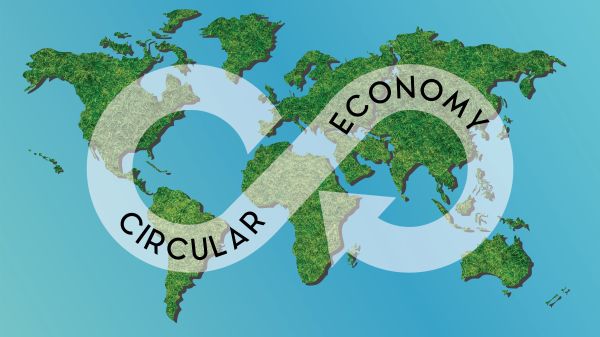Webinar: The Circular Economy: Creating the World We Want

July 16, 2020, 3-4:15 PM ET - RECORDED
Speakers: Pramod Kumar Sharma, Foundation for Environmental Education and Bill Wescott, Brain Oxygen LLC
The problems of climate change, contaminated air and water, and waste management have all been made worse by consumerism fed by a “take-make-waste” production model. How can improvements in quality of life and economic development be decoupled from the consumption of limited resources? The concepts of “circular economy'' address this question by taking inspiration from nature as a regenerative system (renews, restores, and grows on its own) with no concept of waste. The circular economy provides us with a conceptual framework to design our production and consumption systems to focus on the value provided while moving towards “zero waste” as key outcome. Assets are designed to provide service that can be shared, reused, and renewed with as little material and energy lost as possible. This system is how many societies have functioned in the past and even the present (e.g., repairing and reusing goods so they can continue to provide value to users) and includes aspects of the sharing economy.
In this webinar, two international environmental experts demystify the concept of the circular economy to show how it directly addresses the major environmental challenges we face, ways to advance it through education, and how it can strengthen STEM teaching.
Join the conversation in the comments below (if signed into your eePRO account). Thank you!











Comments
In reply to 906 by Bryan Nichols
Nature is only perfect example. Rest are adopting many principles associated with the circular economy. We are somewhere between recycling and circular economy.
Some examples are here https://www.ellenmacarthurfoundation.org/our-story/our-network/members
In reply to 3177 by Bryan Nichols
The pandemic is certainly one of the greatest challenges the world has faced and will continue to have systemic and unexpected impacts that affect every aspect of life, including how we implement circular economy solutions. In the near term, the approach of cross-user reuse will be more challenging, requiring innovative decontamination technologies and business models (e.g., sterilizing masks for reuse). The huge economic impacts may actually be an opportunity to rethink how we live and the significant cost savings created by a circular economy model (along with the environmental positive impacts which can also impact human health, including disease) can make these approaches even more attractive and perhaps necessary. There is the observation that "science advances one funeral at a time" reflecting how hard it is to change mental models and group behavior; perhaps this dramatic economic impact will help the world advance to a more sustainable (and in many cases, circular) way to provide meaningful quality of life to all inhabitants of our planet.
In reply to 3176 by Bryan Nichols
Focussing on skills that promotes critical thinking is important and it can help to overcome both Circular Economy and STEM challenges. The process of scientific enquiry is required and the educational process should strengthen the same. STEM is integral to Circular Economy as we need good understanding of materials, designs, inspiration from natural systems etc. to Advance Circular Economy.
In reply to 3176 by Bryan Nichols
The Circular Economy is a great way to learn about ecosystems and employ design and systems thinking, which can really strengthen STEM instruction by showing the inter-relationships across STEM subjects and with non-STEM subjects (e.g., social sciences, philosophy), making STEM topics even more relevant and exciting (e.g., applications for everyday life, showing the importance of STEM innovation), and helping create independent, critical thinkers.
In reply to 546 by Bryan Nichols
Choose products and services that are in compliance with principles of Circular Economy or help advance it. Make sustainability criteria in making production and consumption decisions. We need to make sustainability a Societal Norm that help in the transition.
In reply to 546 by Bryan Nichols
In many cases, the multinationals can be much more profitable by implementing circular economy approaches! This is the case particularly when the somewhat recent trend of "productizing" a service can be reversed by selling the service created by a given good. Cloud computing is a great example of the shift to selling hardware and software to selling computing services. Companies, both multinational and national, which rely on the extractive approach of the linear economy are the ones initially threatened by the more profitable/less costly circular approaches and will need to adapt/transition (e.g., mining landfills instead of primary material mines).
In reply to 510 by Bryan Nichols
The change cannot happen overnight. SDGs provide a broad framework and inherent conflict between the targets is recognised in the current paradigm of the economic model that measures consumption. The goal of Quality of Life vs. Standard of Livings is an important reflection we all need to have. Bill mentioned how Bhutan is looking at the Gross Happiness Index as a measure of development. Human Development Index is an important element that needs to be seen along with Footprint. It is a complex problem and we need to start making some sacrifices in the short term to steer this as an ethical principle. Current Pandemic has shown how fragile is everything and changes that were unthinkable some months back have happened. We need to start ...
In reply to 510 by Bryan Nichols
Good point! Many circular economy solutions may involve higher upfront costs even though the total life cost is nearly always much lower. When LED bulbs first came out, they were very expensive compared to incandescent even though LED costs are some 90% less over 10 years. The solution to lower LED costs was to recognize that utilities benefit via "negawatts" (not having to build new generation & transmission capacity), so the utilities could subsidize the initial costs, making it comparable to incandescent. This general approach is valid for Circular Economy: find the parties who will realize economic benefits over the long term so the implementation can be financed in the short term.
One more from the webinar chat: Immediate cost vs. long term cost is not a relevant option for many that don't have accumulated wealth. How do we ensure circular economy principles are possible and relevant for all when so many sustainable development goals are severely lacking?
Here's another question from the webinar chat: What do you think about circular economy and STEM challenges?
Hi Pramod and Bill, we ran out of time to address all the questions in the webinar chat. Here's one:
How do you get buy-in from multinationals whose performance is measured by profit and output maximization?
Use of single-use plastics and other materials (restaurant take-out containers and in-person dining disposable dishes and napkins, disposable masks and gloves, plastic bags at farmers markets, etc) is increasing again during the pandemic, as people are concerned about their safety. Is there a solution for public safety from diseases like COVID-19 while still reducing waste?
What are current examples of a circular economy that exist today, if any?